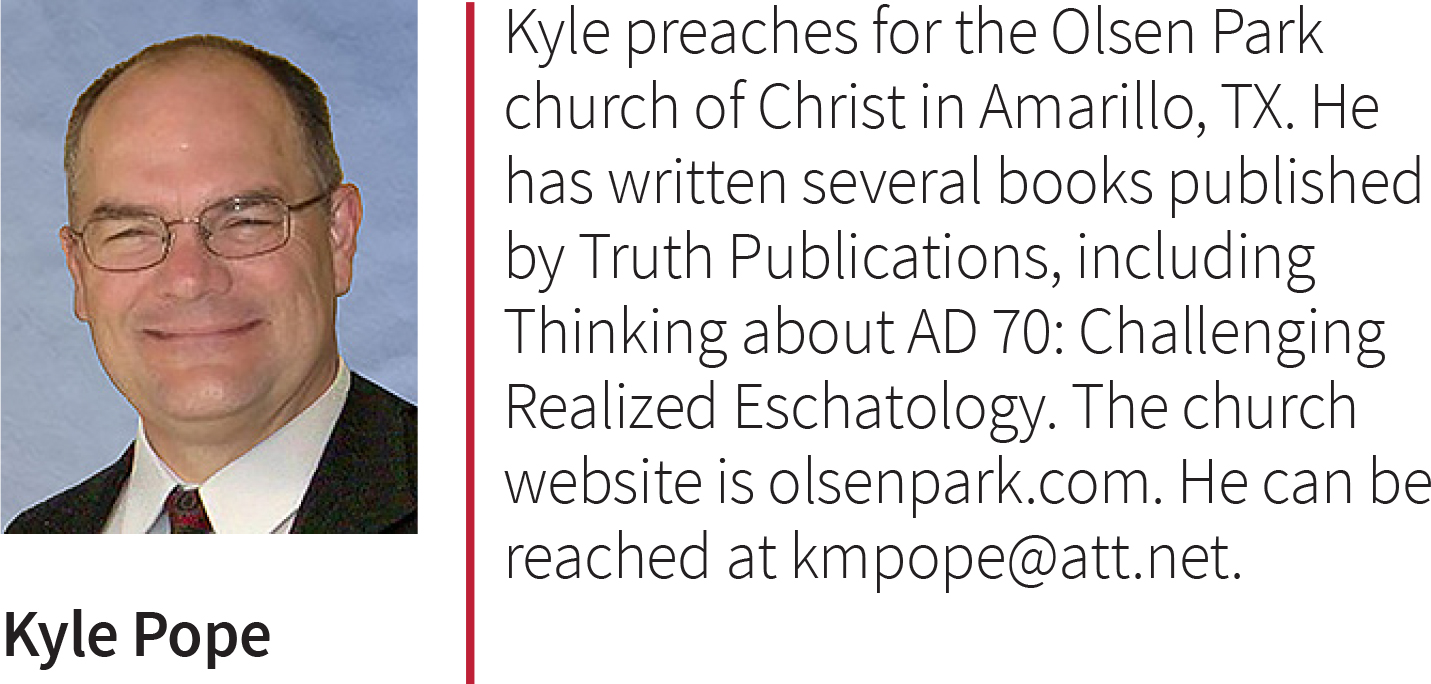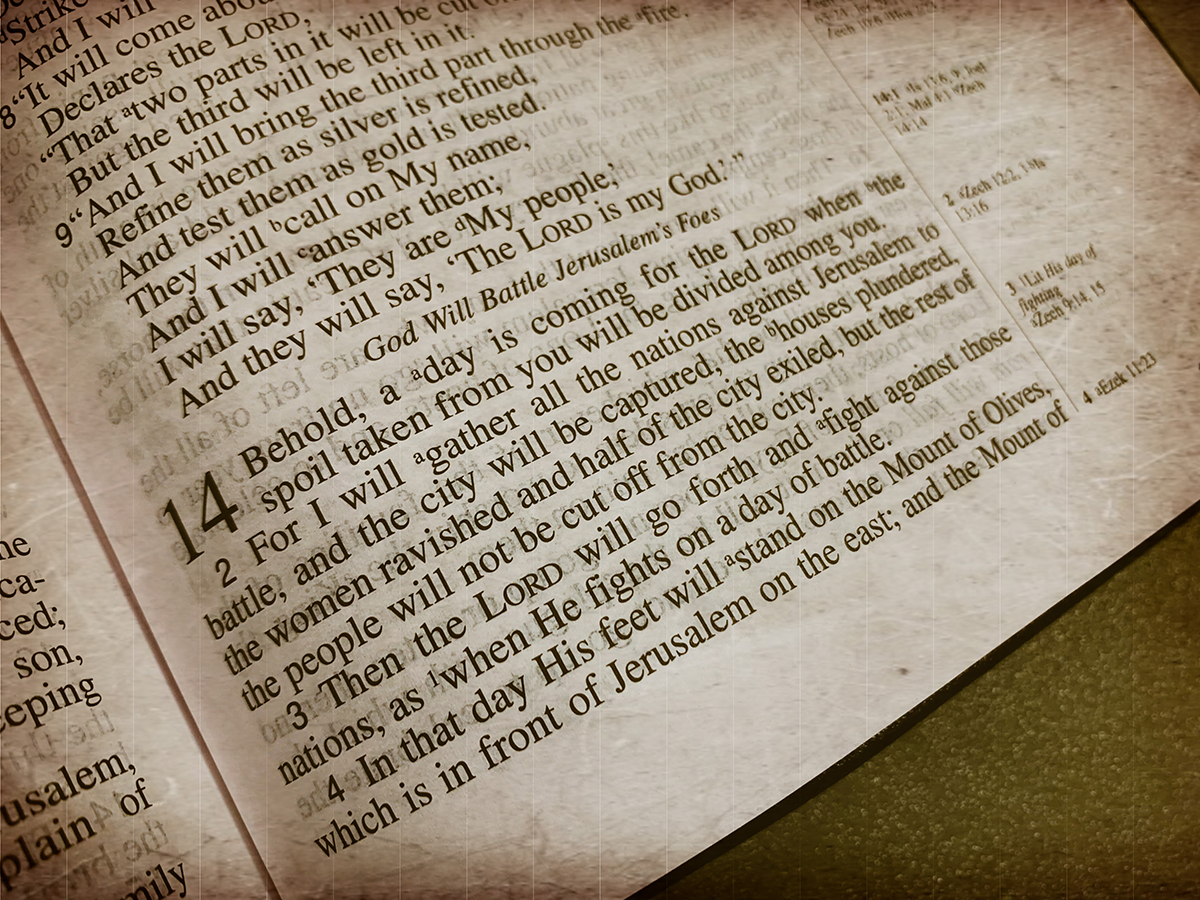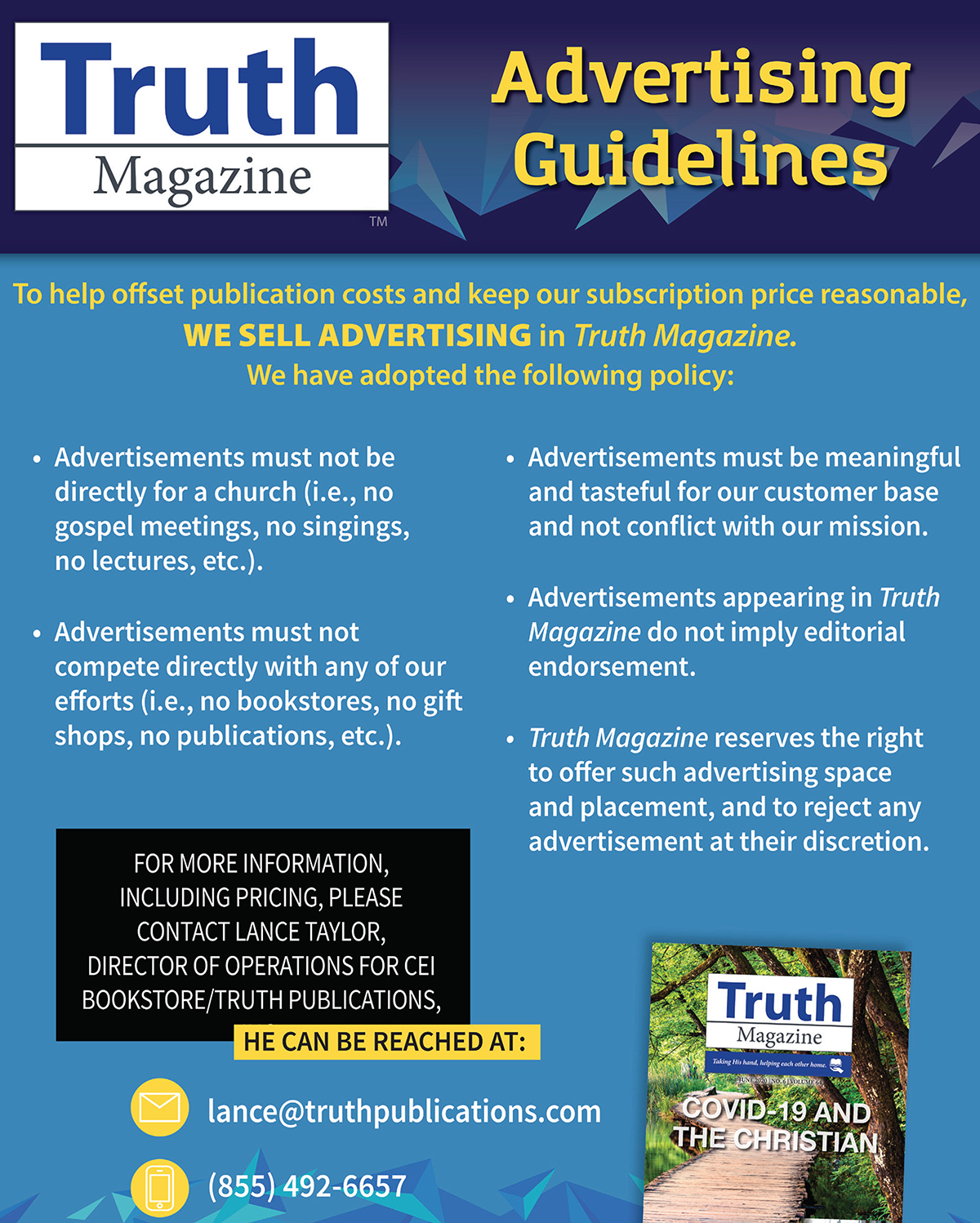by Kyle Pope
Synopsis: Zechariah encouraged the returning remnant and foreshadowed the coming of Christ. Kyle offers a contextual explanation of the 14th chapter, which affirms that God will defend spiritual Zion against her adversaries.
In July, the Olsen Park church in Amarillo, TX, where I preach, hosted a debate on the doctrine known as Realized Eschatology, Full-Preterism, or the AD 70 Doctrine. All four nights of the discussion can be viewed on our church website: www.olsenpark.com. To the surprise of many of us involved in the debate, a significant amount of time was spent on the last three chapters of Zechariah. Brother Holger Neubauer (who advocates this doctrine) emphatically argued that the proclamation of Zechariah 14:2b: "The city shall be taken, the houses rifled, and the women ravished" (NKJV), must refer to the events of AD 70, and cannot apply to Pentecost. His opponent, brother Bruce Reeves (for whom I had the honor to moderate), never claimed that this passage applies to Pentecost. Unfortunately, Neubauer continued to charge him with this belief, and time did not allow Reeves to address this accusation specifically.
Those unfamiliar with the AD 70 Doctrine may wonder why a passage like this would become so pivotal in a debate on the Second Coming of Christ. If I understand it correctly, here is the rationale: First, Zechariah 13:1-6 describes a time when a fountain will flow for forgiveness from Jerusalem, and also when the prophet and evil spirit will be cut off from the land. Second, Neubauer argues that this describes the end of a forty-year "transition period" from the cross until AD 70 during which the Mosaic Law continued, miraculous gifts operated, the church was established but not fully consummated, and full forgiveness of sins awaited the Lord's coming in judgment and the ushering in of complete salvation with the destruction of Jerusalem.
Brother Neubauer argued passionately that this passage's reference to "houses rifled" and "women ravished" unquestionably proved that it described AD 70. Still, he failed to read the rest of the verse: "Half of the city shall go into captivity, but the remnant of the people shall not be cut off from the city" (Zech. 14:2c). Jesus forewarned and commanded His disciples concerning the events of AD 70:
But when you see Jerusalem surrounded by armies, then know that its desolation is near. Then let those who are in Judea flee to the mountains, let those who are in the midst of her depart, and let not those who are in the country enter her (Luke 21:20-21).
According to Jesus, unlike Zechariah 14:2c, there would be no faithful "remnant" preserved within the city when it was destroyed in AD 70. Instead, He commands the faithful to flee from it and not to "enter her." Although brother Reeves did not specifically address the "women-ravished" element of the passage, he did raise how the promise it makes to the faithful "remnant" discredits the argument that this is AD 70. Brother Neubauer never answered that inconsistency.
So how does Zechariah address these issues, and what bearing does it have on the questions raised by full-preterism? The book of Zechariah dates itself in three passages. The first two fall in the "second year of Darius" (Zech. 1:1; 1:7) and the third occurs in the fourth year of his reign (Zech. 7:1). While Darius was a common name among Medo-Persian royalty, this reference is to the fourth Persian king, Darius Hystaspes, who reigned from 522-486 BC. During his reign, Jews who had returned from Babylonian exile were allowed to resume the rebuilding of the temple in Jerusalem (Ezra 4:24).
The book of Zechariah is an interesting blend of encouragement, promise, and warning. It begins with a reminder of why Israel had faced exile: "The Lord has been very angry with your fathers" (1:2), but moves quickly to hold out the Lord's promise of mercy: "'I am returning to Jerusalem with mercy; My house shall be built in it,' says the LORD of hosts" (1:16b). The book calls Israel to a renewed relationship with God during the continued return from exile: "Up, Zion! Escape, you who dwell with the daughter of Babylon" (2:7). At the time Zechariah writes, those who act against God's people are warned, "I will shake My hand against them, and they shall become spoil for their servants" (2:9b).
In addition to focusing on Israel's past and present, Zechariah is also a book of future promise. The Lord declares:
Sing and rejoice, O daughter of Zion! For behold, I am coming and I will dwell in your midst," says the LORD. "Many nations shall be joined to the LORD in that day, and they shall become My people. And I will dwell in your midst. Then you will know that the LORD of hosts has sent Me to you" (2:10-11).
Certainly, this describes the blessings of a renewed relationship with God, but it also foretells a future in which not only the Jews but "many nations" shall be God's people, "joined to the LORD." At a time when temple worship was being restored, the Lord reveals to Zechariah the coming of One that He calls, "My servant the BRANCH" (3:8), whom He says "shall build the temple of the LORD" (6:13a). This will not be an ordinary temple. The One who is called the "BRANCH" will act as Priest and King, who "shall sit and rule on His throne; so He shall be a priest on His throne" (6:13b). This was not permitted under Mosaic Law. Under the Old Law, priests came from Levi, and the Davidic throne came from Judah. Yet, this temple will involve "Even those from afar" who "shall come and build the temple of the LORD" (6:15a).
As if to balance such wonderful promises, the Lord then offers warnings. He reminds them, "Should you not have obeyed the words which the LORD proclaimed through the former prophets, when Jerusalem and the cities around it were inhabited and prosperous" (7:7a). Because of their past failures, God had "scattered them with a whirlwind among all the nations which they had not known" and "the land became desolate after them" (7:14a).
This repetition of encouragement, promise, and warning runs throughout the book. The Lord proclaims, "I am zealous for Zion with great zeal" (8:2b, ENCOURAGEMENT). "Thus says the LORD: 'I will return to Zion, and dwell in the midst of Jerusalem. Jerusalem shall be called the City of Truth, the Mountain of the LORD of hosts, the Holy Mountain'" (8:3; cf. 10:6, PROMISE). "They shall be My people and I will be their God, in truth and righteousness" (8:8b; 10:9-10, PROMISE). "Let your hands be strong, you who have been hearing in these days" (8:9b; cf. 10:12)—"'Now I will not treat the remnant of this people as in the former days,' says the LORD of hosts" (8:11, ENCOURAGEMENT). Yet, He also admonishes them, "Let none of you think evil in your heart against your neighbor; and do not love a false oath. For all these are things that I hate,' says the LORD" (8:17; cf. 10:3, WARNING)—even warning pagan nations of His judgment (9:1-8; cf. 11:1-3, WARNING).
This promise of a different kind of temple, and a future involving unification of the Jew with Gentile nations is so clear in Zechariah one wonders how the Jews of the first century could miss it! The Lord promises:
"Yes, many peoples and strong nations Shall come to seek the LORD of hosts in Jerusalem, and to pray before the LORD." Thus says the LORD of hosts: "In those days ten men from every language of the nations shall grasp the sleeve of a Jewish man, saying, 'Let us go with you, for we have heard that God is with you'" (Zech. 8:22-23).
Whatever conclusions we draw about this book's final chapters, let us not forget this emphasis and this promise. Zechariah is a highly messianic book. After foreshadowing fellowship with the nations (8:22-23) yet warning these same sinful nations (9:1-8), we see a messianic prophecy which is specifically cited in the New Testament: "Rejoice greatly, O daughter of Zion! Shout, O daughter of Jerusalem! Behold, your King is coming to you; He is just and having salvation, lowly and riding on a donkey, a colt, the foal of a donkey" (9:9). Matthew quotes this passage directly and describes it as being fulfilled in Jesus's triumphant entry into Jerusalem at the start of the final week before His death (Matt. 21:1-10). Clearly, Zechariah is not talking about AD 70, but about Jesus's first coming. He promises a messianic reign that will span from "sea to sea" and "to the ends of the earth" (9:10)—something accomplished long before AD 70 (Matt. 28:18; Rev. 1:5).
Another messianic allusion comes in a warning to Israel's shepherds. In Matthew 27:9-10, the apostle quotes Zechariah 11:12-13, describing the thirty pieces of silver that were paid as a betrayal price for Jesus and then used to purchase the potter's field. Matthew affirms that this fulfilled what Jeremiah wrote, which either includes elements from Jeremiah that also relate to this (cf. Jer. 19:4, 6; 32:6-9) or the ancient arrangement of scrolls which placed Jeremiah before Ezekiel, Isaiah, and the Minor Prophets (Babylonian Talmud, Baba Batra 14b). While this is an unusual application of the text of Zechariah, the Holy Spirit makes it clear the context of Jesus's death is the focus, not AD 70.
This sets the background for the closing chapters of the book. Preterists argue that the last three chapters of Zechariah describe a single act of judgment, introduced by the words, "The burden of the word of the LORD against Israel" (12:1a). While this wording often precedes a coming punishment (cf. Isa. 21:13; Jer. 23:34; etc.), it literally refers to a weight to be borne—as seen in the "burden of the beasts of the south" (Isa. 30:6) who would carry the riches of the wicked.
The opening words of this "burden" in Zechariah do not foretell punishment, but protection. Like the warning of 2:9b that the Lord would fight against those who assault His people, God declares to any who "lay siege against Judah and Jerusalem" that their efforts will be like taking a "cup of drunkenness" (12:2), who would be "cut in pieces, though all nations of the earth are gathered against it" (12:3)—hardly a description of AD 70! In fact, God promises, "In that day the LORD will defend the inhabitants of Jerusalem" (12:8a)—"It shall be in that day that I will seek to destroy all the nations that come against Jerusalem" (12:9). That's not AD 70! How does the Lord indicate that He will offer this protection? He promises,
And I will pour on the house of David and on the inhabitants of Jerusalem the Spirit of grace and supplication; then they will look on Me whom they pierced. Yes, they will mourn for Him as one mourns for his only son, and grieve for Him as one grieves for a firstborn (Zech. 12:10).
This is another messianic prophecy. John says it was fulfilled in Jesus's side being pierced at His crucifixion (John 19:37). Zechariah speaks of mourning over this "pierced" One (12:10-14), through whom the "Spirit of grace and supplication" was poured out—not in Jerusalem's destruction in AD 70.
This is the context of the "day" in which "a fountain shall be opened for the house of David and for the inhabitants of Jerusalem, for sin and for uncleanness" (13:1)—the sacrifice of Jesus upon the cross. Instead of referring to a literal fountain, Zechariah points to the "pierced" One who is the source of this "fountain" for "sin and uncleanness" (cf. Jer. 17:13—"The LORD, the fountain of living waters"). This did not wait for AD 70 (as proponents of this doctrine claim). Before that event (if their early dating of Revelation is correct—which I reject), John saw the "pierced" One (Rev. 1:7) who was said to have "loved us and washed us from our sins in His own blood" (Rev. 1:5). I would actually agree with the preterists that Zechariah 13:2-6 anticipates the time when spiritual gifts would end. While Joel 2:28-32 foretells the outpouring of these gifts, Zechariah 13:2-6 (like 1 Corinthians 13:8-13) looks to its termination. Yet, there is no forty-year "transition period" spelled out here. The prophet doesn't jump from Jesus's sacrifice on the cross to AD 70. He is generally dealing with the cross and its impact and consequences.
This is clear from yet another messianic prophecy that follows the foretelling of the termination of prophecy itself. The Lord proclaims, "'Awake, O sword, against My Shepherd, against the Man who is My Companion,' says the LORD of hosts. 'Strike the Shepherd, and the sheep will be scattered'" (13:7a). Jesus Himself quotes this passage of what will begin on the "night" of His betrayal (Matt. 26:31; Mark 14:27)—His disciples would flee in fear. Yet, Zechariah's application suggests that the Lord meant this not merely of the disciples' fear on that night but anticipated the cycle of persecution and opposition against God's faithful remnant who serve the Lord's "Shepherd." Jesus warned, "If they persecuted Me, they will also persecute you" (John 15:20b). The inevitability of this persecution is likely what is meant by the call "awake O sword"—not a call to judgment but to the reality of coming persecutions (cf. Matt. 10:34).
This is the context of brother Neubauer's passage. What will happen as a result of the striking of the "Shepherd"? "Two-thirds in IT shall be cut off and die, but one-third shall be left in IT" (13:8b, emphasis mine). The Lord promises, "I will bring the one-third through the fire, will refine them as silver is refined, and test them as gold is tested. They will call on My name, and I will answer them. I will say, 'This is My people'; and each one will say, 'The LORD is my God'" (13:9).
Let's ask what "it" is?—being described here. Zechariah 14:2a speaks of nations that come "against Jerusalem." If this refers to physical Jerusalem, as noted above, it couldn't apply to AD 70—there was no "one-third" of the city preserved and refined (cf. Matt. 24:21). Could this refer to spiritual Jerusalem (cf. Heb. 12:22)? We have already seen Zechariah describe a new type of spiritual temple (6:13, 15a). We have seen the promise of a spiritual fountain of forgiveness (13:1). The verses that follow seem to describe spiritual rather than physical things. "The LORD will go forth and fight against those nations" (14:3; cf. Rev. 2:16—"fight against them with the sword of My mouth"). The Mount of Olives will split in two as the Lord stands on it (14:4). Is this literal? "Living waters" flow "from Jerusalem" to the Dead Sea and the Mediterranean Sea (14:8). Is that literal? Ironically, preterists would likely understand all of these things as spiritual or figurative, except 14:2b—"The city shall be taken, the houses rifled, and the women ravished."
Jesus declared, "He who believes in Me, as the Scripture has said, out of his heart will flow rivers of living water" (John 7:38). Zechariah says that "living waters" would flow "from Jerusalem" (14:8)—not the physical city, but the spiritual dominion of those faithful to God. As God has offered encouragement, promise, and warning throughout Zechariah's prophecy—in the last chapters, He tells the faithful Jews who were rebuilding the temple of a future time with a spiritual temple, city, and fountain of forgiveness. Although they will face persecution, and some may even turn from the Lord—which likely both explain the spiritual sense of 14:2b: "The city shall be taken, the houses rifled, and the women ravished"—the Lord still promises the spiritual Jerusalem of His faithful remnant who will one day be cleansed by His "pierced" One, "The people shall dwell in it; and no longer shall there be utter destruction, but Jerusalem shall be safely inhabited" (14:11). That's not talking about AD 70; instead, it refers to God's people serving Him in faithfulness to the BRANCH, God's Shepherd, and the "pierced" One who is the fountain for "sin and uncleanness."


